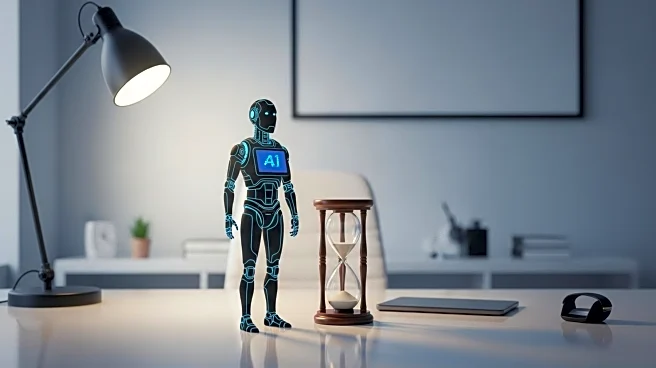What is the story about?
What's Happening?
Josh Bersin, a leading industry analyst, addressed the ongoing AI transformation in the HR sector during his keynote at HR Tech. Bersin outlined four phases of AI transformation: assistance, automation, multi-function agents, and autonomy. These phases represent a progression from using AI tools for specific tasks to fully integrating AI agents into job processes, potentially improving efficiency by up to 300%. Bersin emphasized that AI is reshaping the job market, leading to a consolidation of HR tech companies as they strive to become leaders in AI transformation. Despite concerns about AI-driven job losses, Bersin noted that organizations are slowing hiring due to anticipated AI investments rather than direct job cuts.
Why It's Important?
The AI transformation in HR is significant as it influences job market dynamics and organizational structures. Companies that effectively integrate AI can achieve higher profitability by redesigning jobs and workflows. This transformation requires HR departments to shift their talent management strategies, focusing on collective talent density rather than individual career paths. The ability to adapt to AI-driven changes will be crucial for companies to remain competitive. As AI tools become more prevalent, HR professionals must develop new skills to manage AI systems and facilitate their integration into business processes.
What's Next?
Organizations will need to focus on reskilling and redeploying employees to align with AI-driven changes. HR departments must understand the strategic implications of AI transformation and identify areas where employees can be moved or retrained. The development of 'supermanagers' who can effectively manage AI systems will be essential. Companies that successfully navigate these changes will likely see increased efficiency and profitability. The ongoing consolidation in the HR tech market suggests that major players will continue to invest in AI capabilities to maintain their competitive edge.
Beyond the Headlines
The ethical implications of AI transformation in HR include concerns about job displacement and the need for transparent communication about AI's role in workforce changes. Companies must address these issues to maintain employee trust and morale. Additionally, the cultural shift towards AI integration may require changes in organizational values and practices, emphasizing adaptability and continuous learning.
















